- Home
- Steven Ehrman
The Viking General (A Sherlock Holmes Uncovered Tale Book 9) Page 8
The Viking General (A Sherlock Holmes Uncovered Tale Book 9) Read online
Page 8
“I will not allow you to take the punishment for my misdeed,” said Burton Winfield. “I have no one, Sara. You have your family. Listen to reason, and tell Mr. Holmes that you made up your confession to shield me.”
“Burt, you are making a fool of yourself,” said Judge Banner. “No one with a brain would believe your wild tale. It is transparently obvious that you are doing this to protect Sara. We have come here to listen to Mr. Holmes and I suggest that we do just that.”
Burton Winfield could see he was beaten, and he and Sara Compton sat at opposite ends of the same couch. Inspector Cavendish stood by the fireplace and looked to Holmes.
“The floor is yours, Mr. Holmes,” he said. “I hope to God that you can untangle this mess.”
“Thank you, Inspector,” said Holmes. “We have heard two different confessions to the death of Jonah Compton. Now, I shall tell you what really transpired that night.”
Chapter Twelve
“I arrived at this house the night of the murder, knowing no one save my friend, Dr. Watson,” began Holmes. “I was presented with the tale of a locked door and a killer who had escaped through an open window. I immediately noticed a problem with this story. It was obvious at a glance that the door had not been locked. When confronted with this evidence, Sara Compton confessed to the crime, while giving few details. But again, there is a difficulty. Her version of how the shots were fired did not match anyone else’s recollection. Why tell this lie? I believe it was because she had no choice. The correct version of the shots might have given pause to consider that something had happened that was at odds with her version of events. In any case, she lied again.
“Through an experiment, I demonstrated that the person who fired the shots into the wall was approximately the same height as Mrs. Compton. However, the General was killed by a knife, so the fact that Sara Compton may have fired the shots may have no bearing on the murder.”
“Don’t forget that one bullet went into the ceiling, Holmes,” said I.
“I have not forgotten, Doctor, but I will come back to that,” said Holmes. “There were many things about this case that puzzled me and any solution to the case would have to answer them.”
“What things, Mr. Holmes?” asked Cavendish. “So far I have heard nothing that sheds any light on the murder.”
“Patience, Inspector. When I am done, I think you will find that I will have illuminated all. Now, as to the important points to the case. The first thing that I noted was that both weapons were the General’s own property. We find that the General has recently written a new will, and that he was in a hurry to have it completed. Taken together, what do these things suggest? Watson, I ask you.”
“Are you suggesting that the General committed suicide?” I asked.
“I thought it a possibility from the first. Because if Sara Compton was lying when she said she killed her husband, then she was shielding someone. I asked myself, who would she allow to murder her husband and get away with the crime? The only possible answer was that she was shielding her own husband, or at least his reputation.”
“It is a lie!” cried Sara Compton. “General Jonah Compton would never do something so cowardly.”
“I agree with Mother,” said Thomas Compton. “Suicide is against everything in my Father’s character.”
“Is this all you have, Mr. Holmes?” asked Cavendish. “Just vague feelings and intuition?”
“There is more, I assure you, Inspector,” said Holmes. “Some of the most important testimony came from the General’s grandchildren. William Compton told the Doctor, and the Doctor told me, that he and the General were playing a game of pretend of late. Meanwhile, Emily Grey overheard an angry conversation between her grandparents in which the General speaks of preventing something from happening again, and a mysterious mention of a big moor.
“Taken one by one, these clues meant little to nothing, but then I noted another discrepancy in the case. I am told that all the men of the Compton line are very long lived, but I find that Mr. Harold Compton, the General’s father, died at the relatively young age of sixty-five. I became convinced that the answer to the death of General Compton lay in the past. To be precise, back to the supposed death of his own father.”
“What do you mean supposed death, Mr. Holmes?” asked Richard Compton. “Father lies in repose in the family mausoleum.”
“I assure you, he does not,” replied Holmes. “Twenty years ago, when you heard word of his death, all the family members were away. The two youngest children were in school and Thomas Compton was in the Pacific. You, sir,” he said to Richard Compton, “were also overseas.”
“South Africa, actually,” murmured Richard Compton.
“What actually happened was that the General and his wife merely pretended that Harold Compton died.”
“Well, if he did not die, then what happened to him?” asked the Inspector. “Where has he been all these years?”
“He is alive and physically healthy,” said Holmes.
“You know where he is?” I asked.
“I do, Doctor. The grandchildren told me where to find him. I thought that the game young William called pretend with his grandfather might be a child’s view of something far more dangerous. Also, Emily’s overheard conversation of not letting something happen again and of a big moor completed the picture. You see, Emily misheard what her grandparents were really talking about. I was most puzzled by the mention of the big moor. There are no moors in the area and a Moorish man answers nothing, but what if, instead of a big moor, they were speaking of Broadmoor?”
“The lunatic asylum?” asked a horrified Warren Compton. “It cannot be. It is too awful.”
“Awful, but true, Mr. Compton,” said Holmes gravely. “I have communicated by telegraph with the Director of Broadmoor. He confirms that Harold Compton has been confined there these past twenty years. Isn’t it time for the truth to finally be told, Mrs. Compton?”
Sara Compton looked at Holmes with eyes that projected an immense sadness.
“How did you know, Mr. Holmes?” she asked. “I cannot believe that it was only what the children said.”
“There was one more clue that led me to the truth,” said Holmes. “Not only did the General make a new will, but he left all of his estate to Warren, and disinherited Thomas and Mrs. Grey.”
“What?” cried Warren. “I was never Father’s favourite. Quite the contrary, in fact. I know he was disappointed in me and thought me a wastrel.”
“But you had one important attribute, Mr. Compton. As you were an adopted child, you carried none of the tainted blood. Tainted, at least, in the mind of the General.”
“So he killed himself because he thought he was going mad?” asked Judge Banner.
“Not simply that, but he was afraid he was going to go mad and then live several more decades, as his own father has done.”
“Mother, is this true?” asked Anna Grey. “Did Father kill himself?”
After a few moments of silence Sara Compton spoke.
“It is true, but you must forgive him. He faced a horrible future. I suppose it must all come out now. You see, your grandfather began to slip into madness several years before matters came to a head. He began to act peculiar and even menacing. One day he attacked me, and nearly killed me. Jonah rushed home and your grandfather was committed to Broadmoor. He had gone completely mad by this time and recognized no one.
“We wanted to protect the family name so we began playing the charade that he had died. We had a small service and put an empty coffin in the mausoleum. You have to understand the choice Jonah faced when he felt the symptoms of madness growing upon him. You understand, don’t you, Mr. Holmes?”
“I believe that I do, madam. Being confined in a lunatic asylum for decades is not a happy contemplation.”
“Still, knowing all that, I tried to stop him,” said Sara Compton. “We argued for days and then that horrible night I walked into this room and saw him holding the gun. I knew
at once what he was going to do. I threw myself upon him and wrestled him for the gun. It went off once into the ceiling, and he let go of it. Knowing not what else to do, I emptied the gun into the wall as quickly as I could. That way he would not be able to use it to take his life. However, while I was doing that, he grabbed his knife and…well, you know what he did.
“At that point I was desperate. I quickly made up the story about Jonah arguing with someone. I hoped everyone would believe that a passing tramp or some such person had killed him.”
“But then I made it obvious that the killer must be a family member or close friend because of the presence of the dog, and you decided to confess to protect them, and also to protect the General’s memory. Isn’t that right?” asked Holmes.
“Yes, Mr. Holmes. It is as you say. I hope you can all forgive me for lying. It is just that it all happened so quickly that I knew not what else to do.”
“I think that answers everything, Inspector,” said Judge Banner. “I believe that you can release Sara and Burt.”
“Just a minute, Judge,” said Cavendish. “This has all happened a bit too fast for me. Now, Mr. Holmes, you say this was a suicide.”
“Yes, Inspector.”
“Do not those who commit suicide usually leave a note? Where is it?”
“Would you like to tell the Inspector where the note is, madam?” asked Holmes.
“You have known everything else, Mr. Holmes,” she replied. “Surely you know where the note is.”
“I do, madam,” said Holmes with a small smile. “I had Parker lock this room so that nothing in it would be altered. Only one person, Sara Compton, knew there was a note. She saw it at once after her husband’s death, but where to hide it? It could not be burnt in the fireplace, as it was summer. Also, she had no matches. The general had matches in his pocket and there are no more in the room. She could not conceal it on her person, as she might be arrested at any moment and searched. Indeed, she was arrested and searched. No note was found. There was one more thing that was out of place in the room. A pipe with tobacco in it, lying on the desk. The General did not smoke a pipe and no one in the house does either. The first thing I noticed about the pipe was that it has a very large bowl.”
Holmes picked up the pipe and turned it upside down. The tobacco in it spilled on the desk. He then extracted a torn piece of paper, roughly one-quarter of a sheet, from the bowl with his slender fingers.
“Here is your suicide note, Inspector,” said Holmes, thrusting the note into Cavendish’s hands.
Cavendish quickly scanned the note.
Suddenly, I recalled the torn sheet of paper on which I had scribbled the note I had sent to Holmes the night of the murder.
“Why, Holmes, that must have been torn from same sheet of paper I used to summon you,” said I.
“That is quite likely, Doctor,” said the Inspector, “but we will never know for certain now.”
“It is a shame that you did not save the note, Holmes,” I said to my friend.
“But I did, Doctor,” said Holmes. He then pulled a torn sheet of paper from his pocket and handed it to Cavendish. “I believe you will find that the two match up perfectly.”
The Inspector put the two pieces of paper together and they indeed matched up just like a child’s puzzle piece.
“An entire sheet of paper would never have fit inside the pipe bowl,” said Holmes. “Mrs. Compton saw that at once. She tore off only the section in which the General had written his farewell. The rest of the sheet she left on the desk, hoping it would go unnoticed. It not only was unnoticed as a clue to the suicide, it was removed from the scene entirely by the good Doctor. Since it came from the site of the crime, I decided to keep it at hand.”
“Well, you are truly a magician, Mr. Holmes,” the Inspector said. “Of course, I will have to have this examined to be certain that it is the General’s hand. However, with the evidence of the rest of the sheet of paper, there seems little doubt that it is.”
“Of course, Inspector,” said Holmes. He then turned to Sara Compton.
“It was an admirable choice of hiding place. Had you not been arrested, I am certain you would have disposed of it once you were free to do so.”
“And that is precisely what would have happened had you not been here, Holmes,” said I. “Would you agree, Inspector?”
“You will get no argument from me, Doctor,” said Cavendish in an agreeable manner. “I know I doubted you at times during this investigation, but I freely admit it would not have been solved without you, Mr. Holmes.”
“I cannot take all the credit,” said Holmes. “The Doctor provided the final push that I needed.”
“That is right, Holmes,” said I. “You told me that something I said yesterday gave you some insight. What was it?”
“It was when you accused me of being deranged, Doctor. I realized that you were exaggerating for the sake of making a point, but it planted the seed. It occurred to me that an asylum was the type of place a person could disappear into. That, taken together with evidence of the grandchildren and the new will, set me on the proper path. So you played your part.”
“I shall have to remember to question your sanity more often, Holmes.”
“Of course, Doctor,” replied Holmes.
Epilogue
The next morning found us in the dining room of the inn, having our final breakfast in Lee. As we finished, we were joined once more by Inspector Cavendish.
“I wanted to see you both before you departed,” said the Inspector. “I am glad that I caught you. I wanted to express my thanks again, and to wish you well on your trip back to London. How you knew that Harold Compton had gone mad still eludes me.”
“I am also surprised that you divined that fact from a few remarks from those children,” said I.
“It was more than that,” said Holmes. “The fact that he had hurriedly changed his will demonstrated he knew the end was coming. How many men see their own murder ahead of time? Very few indeed, but men contemplating suicide obviously can see their own demise. That, combined with the fact that the biological children were disinherited in favour of the adopted son, showed contempt for his own blood.
“There was one more telling clue that came from Mrs. Grey. When I asked what her grandfather had done for a living, she said that her father had told her he was a hat manufacturer. Is that not instructive?”
Seeing that the Inspector and I had no answer Holmes continued.
“It is plain that the General was engaging in a little black humour. He was saying, in effect, that his father had gone mad as a hatter.”
“As to the will, I have spoken with the solicitor, Woodcourt,” said Cavendish. “Since it is now obvious that General Compton was not, in fact, of a sound mind when he ordered the new will, the previous testament will stand as the General’s final will.”
“Don’t be surprised if Warren Compton fights that course of action,” said I. “He strikes me as a greedy man. At least, Sara Compton has been cleared. We can be glad that you saw through her deception, Holmes.”
“I actually consider myself derelict in that matter, Watson,” said he. “Because she lied about the door, I thought that she had lied about firing the gun. Even when our little experiment demonstrated that she could have fired the shots, I was focused elsewhere. It is a timely reminder to allow the facts to drive the theory and not the reverse. It was ludicrous to think that she fired five times at close range and missed. I should have realized instantly that the sequence of shots indicated someone simply emptying the gun so as to render it useless.”
“In any case, you triumphed, Mr. Holmes, and I thank you for your aid,” said Inspector Cavendish. “In fact, I also have you to thank for the solving the Addington jewel case. Well, I must be off. Good day, gentlemen.”
Inspector Cavendish took his leave of us with a cheery wave.
“The Jewel of Zanzibar,” I said. “I had completely forgotten about that. Holmes, you said you would tell
me the solution of the case. Since it is solved, I am surprised it has not been the talk of the county. I have heard nothing.”
“Well, the answer to that, Doctor, is that Sir Rodney wishes for it to be so,” said Holmes. “You see the Jewel of Zanzibar was never stolen. Lady Addington sold it years ago to cover some debts that she had indiscreetly run up, and had a counterfeit gem made. The lady became terrified when Sir Rodney spoke of having the jewel newly appraised. Knowing an appraisal by an expert would reveal the switch, she pretended it was stolen. The case was really quite interesting from a technical point of view. Of course, the facts must remain hidden, so I am afraid you will not be able to include it in your writings.”
“That is understandable, but this case is surely to be made public, in which case I could write of it. Odd, that in both of these crimes, the trouble came from within. We think of crime as coming from the outside, but here that was not true.”
“Even the most beautiful garden may contain a poisonous viper, Doctor,” said Holmes. “I was just considering General Compton. Have you realized, that although he was known as the Viking General, he did not die as a Viking warrior would have, in battle? Indeed, he died as a vanquished Roman general would have, by his own hand, with his own sword.”
“I would say that it is too late to change the man’s sobriquet, Holmes,” I said dryly.
“That is true,” he said somewhat sadly. “I suppose if you write of this, you will be compelled to call him the Viking General.”
“Actually, Holmes, that strikes me as a fine title for a recount of this adventure. Shall we leave for London today?”
“Yes, Doctor. This very hour, if we can manage it. I long for my own armchair on Baker Street!”
“As do I, Holmes. As do I.”
The End
special note
If you’ve read and enjoyed The Sherlock Holmes Uncovered Tales, please add a review at the site on which you purchased your copy. Reviews provide a valuable guide for those attempting to find books they might enjoy.

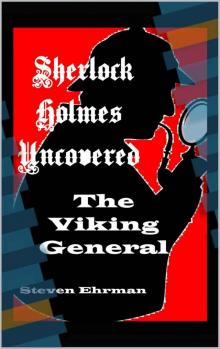 The Viking General (A Sherlock Holmes Uncovered Tale Book 9)
The Viking General (A Sherlock Holmes Uncovered Tale Book 9)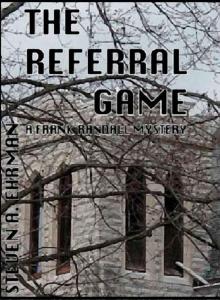 The Referral Game (A Frank Randall Mystery)
The Referral Game (A Frank Randall Mystery) Collection of Four Short Stories
Collection of Four Short Stories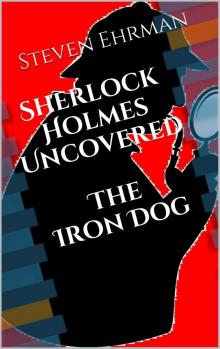 The Iron Dog (A Sherlock Holmes Uncovered Tale)
The Iron Dog (A Sherlock Holmes Uncovered Tale) The Eccentric Painter (A Sherlock Holmes Uncovered Tale)
The Eccentric Painter (A Sherlock Holmes Uncovered Tale)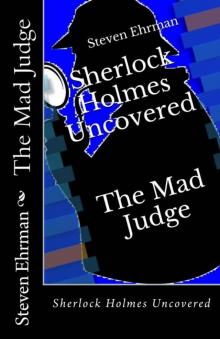 The Mad Judge (A Sherlock Holmes Uncovered Tale Book 3)
The Mad Judge (A Sherlock Holmes Uncovered Tale Book 3)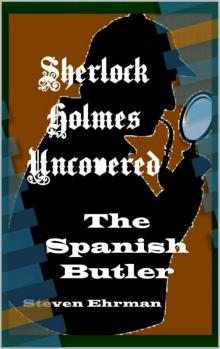 The Spanish Butler (A Sherlock Holmes Uncovered Tale Book 8)
The Spanish Butler (A Sherlock Holmes Uncovered Tale Book 8)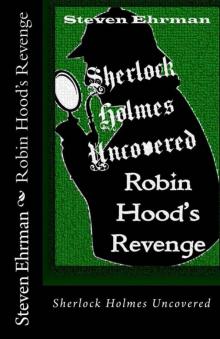 Robin Hood's Revenge (A Sherlock Holmes Uncovered Tale Book 7)
Robin Hood's Revenge (A Sherlock Holmes Uncovered Tale Book 7)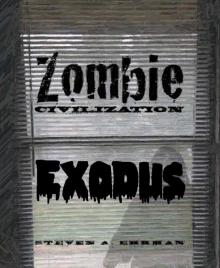 Zombie Civilization: Exodus (Zombie Civilization Saga Book 2)
Zombie Civilization: Exodus (Zombie Civilization Saga Book 2)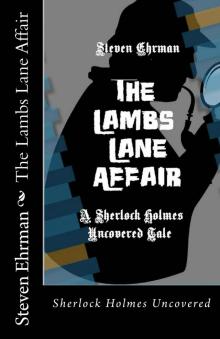 The Lambs Lane Affair (A Sherlock Holmes Uncovered Tale Book 5)
The Lambs Lane Affair (A Sherlock Holmes Uncovered Tale Book 5)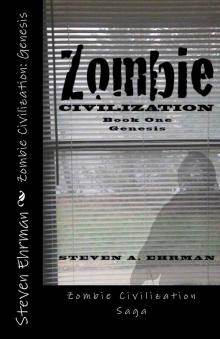 Zombie Civilization: Genesis (Zombie Civilization Saga)
Zombie Civilization: Genesis (Zombie Civilization Saga)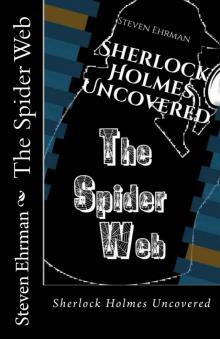 The Spider Web (A Sherlock Holmes Uncovered Tale Book 4)
The Spider Web (A Sherlock Holmes Uncovered Tale Book 4)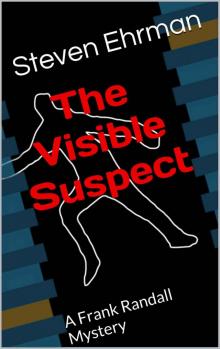 The Visible Suspect (A Frank Randall Mystery)
The Visible Suspect (A Frank Randall Mystery)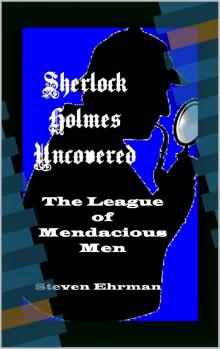 The League of Mendacious Men (A Sherlock Holmes Uncovered Tale Book 10)
The League of Mendacious Men (A Sherlock Holmes Uncovered Tale Book 10)